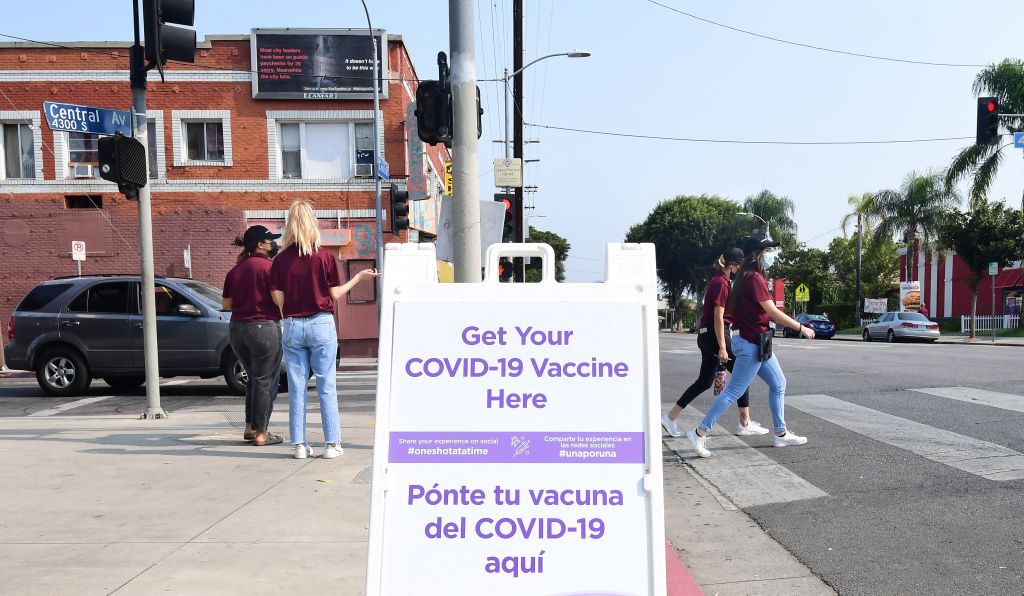Infectious disease expert: Americans must 'recalibrate' vaccine expectations


A free daily email with the biggest news stories of the day – and the best features from TheWeek.com
You are now subscribed
Your newsletter sign-up was successful
COVID-19 vaccines won't eliminate the coronavirus, "no matter how many booster shots the United States gives," Céline R. Gounder writes for The Atlantic. But that's no reason to panic or lose confidence in them.
Grounder, an infectious disease specialist and epidemiologist at New York University's Grossman School of Medicine and Bellevue Hospital in New York City, thinks public health messaging got out of hand early on during the vaccine drive, especially when the Centers for Disease Control and Prevention published real-world evidence that showed that two doses of the Pfizer and Moderna vaccines were 90 percent effective at preventing infections, as opposed to just disease. After that, folks got excited, believing that full vaccination status meant you could only very rarely get infected or transmit the disease. But now that the efficacy appears to be lower, there's a lot of anxiety.
Grounder tried to ease that, explaining that vaccines are typically more effective at protecting against infection outright when battling viruses that have longer incubation periods, like measles and smallpox. In those cases, the body is trained to kick the virus out before it can really establish itself. But the coronavirus and influenza, for example, don't take as long to start replicating and can do so before a vaccinated defense system revs up. Once it does, though, the virus doesn't have much room to operate and is usually blocked from progressing in the lungs and causing serious damage.
The Week
Escape your echo chamber. Get the facts behind the news, plus analysis from multiple perspectives.

Sign up for The Week's Free Newsletters
From our morning news briefing to a weekly Good News Newsletter, get the best of The Week delivered directly to your inbox.
From our morning news briefing to a weekly Good News Newsletter, get the best of The Week delivered directly to your inbox.
With that in mind, Grounder says Americans simply need to "recalibrate our expectations about what makes a vaccine successful." While "the public discussion of the pandemic has become distorted by a presumption that vaccination can and should eliminate COVID-19 entirely," that's not an attainable standard, she argues. And it's one that makes "each breakthrough infection" look "like evidence that the vaccines are not working," even though they're performing "extremely well" and reducing what may have been serious infections to either mild or asymptomatic ones. Read Grounder's full piece at The Atlantic.
A free daily email with the biggest news stories of the day – and the best features from TheWeek.com
Tim is a staff writer at The Week and has contributed to Bedford and Bowery and The New York Transatlantic. He is a graduate of Occidental College and NYU's journalism school. Tim enjoys writing about baseball, Europe, and extinct megafauna. He lives in New York City.
-
 How the FCC’s ‘equal time’ rule works
How the FCC’s ‘equal time’ rule worksIn the Spotlight The law is at the heart of the Colbert-CBS conflict
-
 What is the endgame in the DHS shutdown?
What is the endgame in the DHS shutdown?Today’s Big Question Democrats want to rein in ICE’s immigration crackdown
-
 ‘Poor time management isn’t just an inconvenience’
‘Poor time management isn’t just an inconvenience’Instant Opinion Opinion, comment and editorials of the day
-
 Trump HHS slashes advised child vaccinations
Trump HHS slashes advised child vaccinationsSpeed Read In a widely condemned move, the CDC will now recommend that children get vaccinated against 11 communicable diseases, not 17
-
 A fentanyl vaccine may be on the horizon
A fentanyl vaccine may be on the horizonUnder the radar Taking a serious jab at the opioid epidemic
-
 Health: Will Kennedy dismantle U.S. immunization policy?
Health: Will Kennedy dismantle U.S. immunization policy?Feature ‘America’s vaccine playbook is being rewritten by people who don’t believe in them’
-
 How dangerous is the ‘K’ strain super-flu?
How dangerous is the ‘K’ strain super-flu?The Explainer Surge in cases of new variant H3N2 flu in UK and around the world
-
 Vaccine critic quietly named CDC’s No. 2 official
Vaccine critic quietly named CDC’s No. 2 officialSpeed Read Dr. Ralph Abraham joins another prominent vaccine critic, HHS Secretary Robert F. Kennedy Jr.
-
 This flu season could be worse than usual
This flu season could be worse than usualIn the spotlight A new subvariant is infecting several countries
-
 FDA OKs generic abortion pill, riling the right
FDA OKs generic abortion pill, riling the rightSpeed Read The drug in question is a generic version of mifepristone, used to carry out two-thirds of US abortions
-
 Why are autism rates increasing?
Why are autism rates increasing?The Explainer Medical experts condemn Trump administration’s claim that paracetamol during pregnancy is linked to rising rates of neurodevelopmental disorder in US and UK
